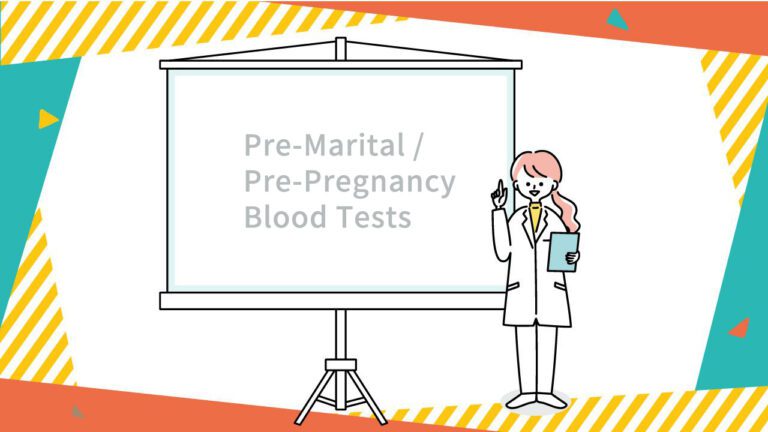1.Haemoglobin
A haemoglobin test can tell if a person has anaemia. If the haemoglobin level is low, the person needs other tests to identify the cause and the type of anaemia, and to see whether treatment is necessary.
2. Thalassaemia
Thalassaemia is a hereditary type of anaemia. Around 8% of the population in Hong Kong are carriers of this disease. The condition is also called thalassaemia minor. A blood test for MCV value can be used as a screening test to check if a person may be a thalassaemia carrier. If the MCV level is low, further tests will be necessary to confirm if the person is indeed a thalassaemia carrier and to differentiate if the person is an alpha(α)-thalassaemia or a beta(β)-thalassaemia carrier. If the couple are both carriers of the same type of thalassaemia gene, their baby will have a one in four chance of suffering from thalassaemia major, a severe form of anaemia. Babies with α-thalassaemia major may die before or soon after birth. Babies with β-thalassaemia major require lifelong regular blood transfusion and medication. Couples carrying the same type of thalassaemia gene can consider prenatal diagnosis to check if the baby is affected by thalassaemia major so that the most appropriate treatment or follow up can be arranged early.
3. Hepatitis B surface antigen and Hepatitis B surface antibody
Around 10% of the population in Hong Kong are carriers of Hepatitis B virus, but most carriers do not have any symptoms. However, the virus can cause acute hepatitis, or chronic liver cirrhosis and liver cancer. Hepatitis B surface antigen test (HBsAg) is the test for Hepatitis B carrier status. Hepatitis B virus can be found in the body fluid of the carriers, such as blood, semen, vaginal discharge and amniotic fluid. It can therefore be transmitted by blood or sexual contact, and can also be transmitted from the carrier mother to the baby during pregnancy or delivery.
To reduce the risk of passing the virus to the newborn, a hepatitis B carrier mother should be tested for viral load with Hepatitis B DNA in early pregnancy. Those with high viral load will be offered anti-viral medication from 28 weeks of pregnancy. The newborn of a Hepatitis B carrier mother should also receive Hepatitis B immunoglobulin injection to further minimize the chance of catching the infection. Individuals who are not Hepatitis B carriers and do not have Hepatitis B antibody (HBsAb) can consider Hepatitis B vaccination.
4. Rubella (German measles) antibody
A woman who has received Rubella vaccination or has had the infection before should have protection against the infection, and therefore can avoid passing the virus to her baby during pregnancy. If a mother who does not have immunity and contacts the Rubella virus during pregnancy, the infection may cause congenital abnormality in the baby, such as deafness, blindness and heart abnormality. If the blood test shows that the woman does not have Rubella antibody (Rubella IgG), she should receive Rubella vaccination before trying for a pregnancy.
5. VDRL (Testing for Syphilis infection)
VDRL is a screening test for syphilis infection. If the test shows a positive result, it may indicate syphilis infection but further tests are required to confirm. A mother who is infected with syphilis during pregnancy may miscarry; or the baby may have congenital abnormality such as deafness and blindness. Early treatment can reduce the chance of infection in the baby.
6. Blood group and Rhesus factor
There are four major blood groups, based on the presence or absence of two antigens – A and B – on the surface of red blood cells. In addition to the A and B antigens, there is a protein called the Rhesus factor, which can be either present (+) or absent (–), creating the 8 commonest blood types: A+, A–, B+, B–, O+, O–, AB+ and AB–. Most Chinese are Rhesus positive (Rh+). If a woman is tested Rhesus negative (Rh-) and her spouse is Rhesus positive (Rh+), there is a possibility of incompatibility between the blood types of the mother and the baby, leading to haemolytic disease of the baby. A Rhesus negative (Rh–) mother needs regular blood checks to see if she needs anti-D immunoglobulin injections during pregnancy and after delivery.
7. HIV antibody test
AIDS stands for Acquired Immune Deficiency Syndrome, and is caused by infection with the Human Immunodeficiency Virus (HIV). This virus mainly destroys a white blood cell called CD4 T lymphocytes. This results in a decrease in immunity and hence the person may be vulnerable to infections and cancers. The full-blown syndrome is called AIDS. Without proper treatment, 50% of HIV carriers will develop AIDS in 10 years. AIDS patients may suffer from opportunistic infections such as tuberculosis or fungal infection, thus increase their mortality rate. Most of these opportunistic infections can be prevented or treated with medications. Unfortunately, there is no treatment for AIDS up to this date. The modes of transmission include sexual contact or blood contact. There is also a 15–40% chance of transmitting the virus from the mother to the baby during pregnancy, delivery or breast feeding. Treatment during pregnancy and delivery can reduce this chance.
Apart from the standard blood tests, there are other optional tests that a couple may wish to consider.
1. Chickenpox antibody test
Chickenpox is a very contagious disease caused by the Varicella-zoster virus (VZV). It is spread by breathing in droplets from infected people that get into the air when they cough or sneeze, or touching the virus particles from chickenpox blisters. Anyone who has never had the disease or never been vaccinated can be easily infected. If an expectant mother gets infected in early pregnancy, the baby may be affected by various congenital abnormalities including skin lesions, neurological defects, eye diseases, skeletal anomalies or even neonatal death. Women with no history of chickenpox infection can have a blood test to check if they have the antibody (VZV IgG). Those without the antibody can consider the Chickenpox vaccine before trying for a pregnancy.
2. Expanded carrier screening (ECS)
Carriers of recessive genetic diseases are usually healthy and do not have symptoms or have only mild symptoms. They often do not have a family history of the disorder. Therefore, most individuals do not know their carrier status unless they undergo genetic disease screening. Carrier screening is a type of genetic test that analyzes a couple’s DNA to identify whether they are both carriers of a genetic disorder, thus providing specific information about their child’s risk for certain genetic disorders.
The American College of Obstetricians and Gynecologists (ACOG) recommends all women who are considering pregnancy should be offered carrier screening for spinal muscular atrophy (SMA), cystic fibrosis (CF), thalassemia and haemoglobinopathies. Fragile X premutation carrier screening is recommended for women with a family history of Fragile X-related disorders or intellectual disability suggestive of Fragile X syndrome, or women with a personal history of ovarian insufficiency. Additional screening may also be indicated based on family history or specific ethnicity. The American College of Medical Genetics and Genomics (ACMG) concurs with a similar advice.
Expanded carrier screening (ECS) means that a panel of inherited genetic disorders is screened in a single blood sample. The ECS test offered in our clinic covers 302 genes, and includes all those genetic diseases recommended to be screened by both the ACOG and the ACMG as well as Fragile X carrier screening.






